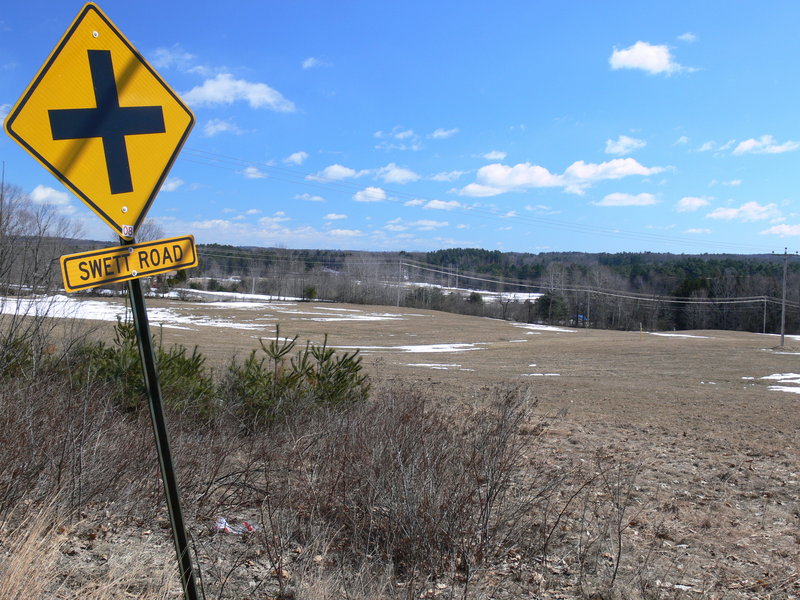Black Brook in Windham cuts lazily through the farm fields and forests of the lower Swett Road, an area bordering Route 202 that looks much like the rest of the town did 50-plus years ago. This lane is one of the last dirt roads around. A circa 1800 farmhouse and 550 acres of land has been in the Clark family since 1950.
“Swett Road is a magnet for people who are seeking peace and quiet,” Ann Clark says. “People sit in their car and eat their lunches down here. It’s not the easiest and most convenient route, but people come through this way on their travels because it’s open land. Two thirds of the traffic we get is people who do not need to be on this road. People walk their dogs and ride horses; it’s already kind of a park. It’s a very accessible piece of property.”
The Clarks say that holding such a large amount of acreage has been rewarding, but not without an immense sense of responsibility, especially now in their later years.
Larry Clark, 70, grew up within walking distance on nearby Town Farm Road. His father amassed five other area farms to reach today’s 551 acres.
“I grew up on the land; I have a strong attachment to it,” Larry Clark said.
Clark and his wife moved into their current farmhouse in 1969 and have farmed the land, mostly through cutting hay and timber, ever since. Unlike his father before him, who lived his days in a largely agricultural town, the Clarks have faced a serious quandary in the last decade: what will become of one of the largest tracts of open land left in Cumberland County, just a few miles from the development pressures of Maine’s largest city?
“We’re only seven miles from Portland,” Ann Clark says.
Back in 2009, the Clarks tried to partner with the Windham Land Trust to preserve the setting. The Trust and the Clarks offered the town the option to purchase the entire 551 acre block for $1.55 million – a good deal less than its market value. The issue went to the voters in November that year, but was defeated by 351 votes.
“It had been in the works for years,” Ann said, “but it turned out to be the absolute worst time because of what happened with the economy. If we were 20 years younger we might be able to wait until the situation improves, but that’s not realistic in our situation.”
Following the referendum defeat, everyone went back to the drawing board. Two weeks ago, the Clarks announced that part of the land had been sold to conservation groups, with 217 acres of mostly open land purchased by the Windham Land Trusts and the Maine Farmland Trust. Both are looking for a new farmer to take over the land and keep it in agricultural use. A new farmhouse and or barn will be permitted on the land.
“Livestock would be a good possibility,” Larry said. “There’s a lot of water associated with the brook and there are springs there. It’s late ground; you can’t get on it very early for planting anything.”
Because of the terms of the sale, which includes a conservation easement, the land trusts soon hope to sell to a new farmer.
Because the value of the property is now assessed as farmland and not its development potential, the groups are optimistic a farmer will be able to come forward in a town where land values make any new farming all but impossible.
In the meantime, the Clarks are not terribly optimistic about the future of their remaining 300-plus acres. Clark is worried that upon his passing, the family will be forced to sell remaining land just to pay the resulting estate taxes.
“I can’t take it with me,” Larry said. “I don’t want to just leave it for someone else to deal with.”
“I’ve received calls from folks (developers) who are monitoring the situation,” Clark said. “They say ‘what you’re doing is good, but if it doesn’t work out to give me a call.”‘
“We prefer to preserve the land,” Clark adds, “but we may very well have to sell to another interest. That may be the only option open to us.”
In the meantime, folks can still take a turn down the “Road Less Traveled” for a bit of the solitude of yesteryear in a town known all too well for the effects of sprawl.
Don Perkins is a freelance writer who lives in Raymond. He can be reached at: presswriter@gmail.com
Copy the Story Link
Send questions/comments to the editors.



Success. Please wait for the page to reload. If the page does not reload within 5 seconds, please refresh the page.
Enter your email and password to access comments.
Hi, to comment on stories you must . This profile is in addition to your subscription and website login.
Already have a commenting profile? .
Invalid username/password.
Please check your email to confirm and complete your registration.
Only subscribers are eligible to post comments. Please subscribe or login first for digital access. Here’s why.
Use the form below to reset your password. When you've submitted your account email, we will send an email with a reset code.